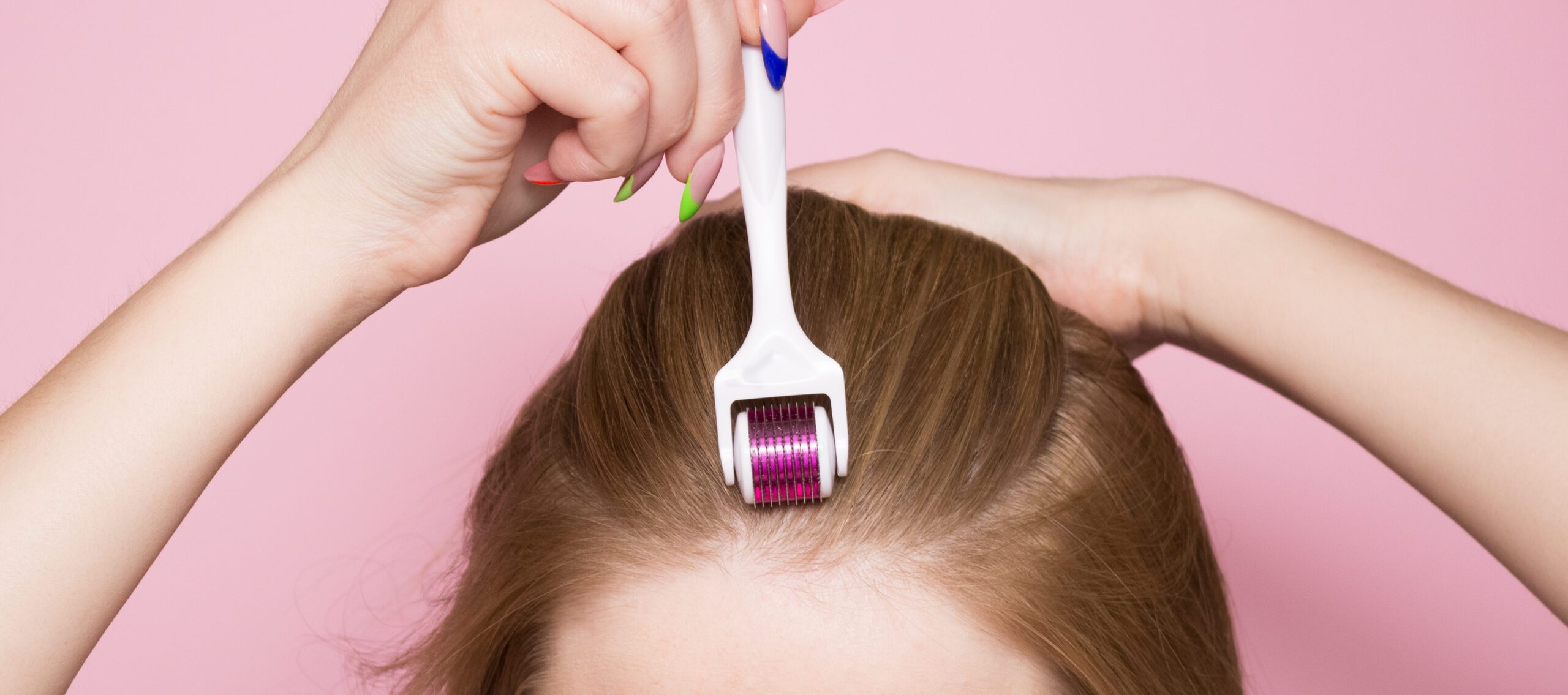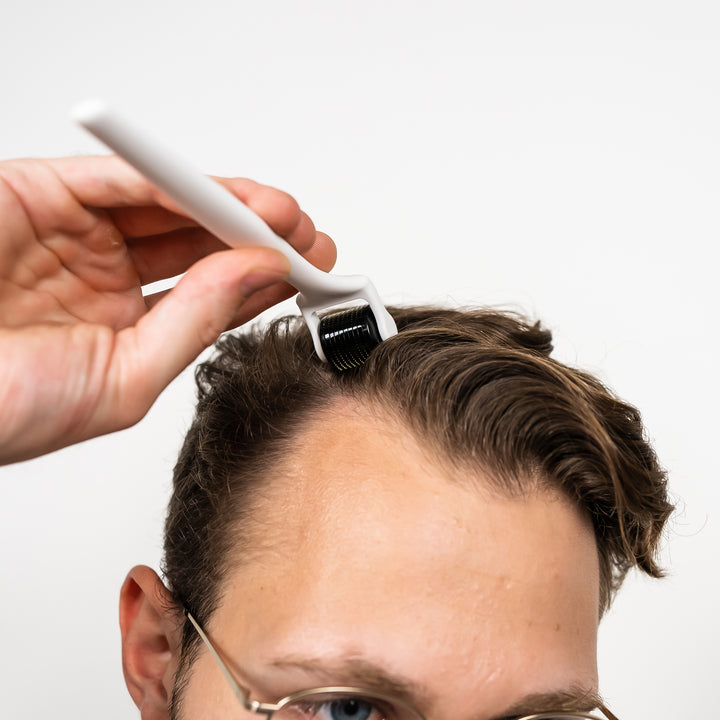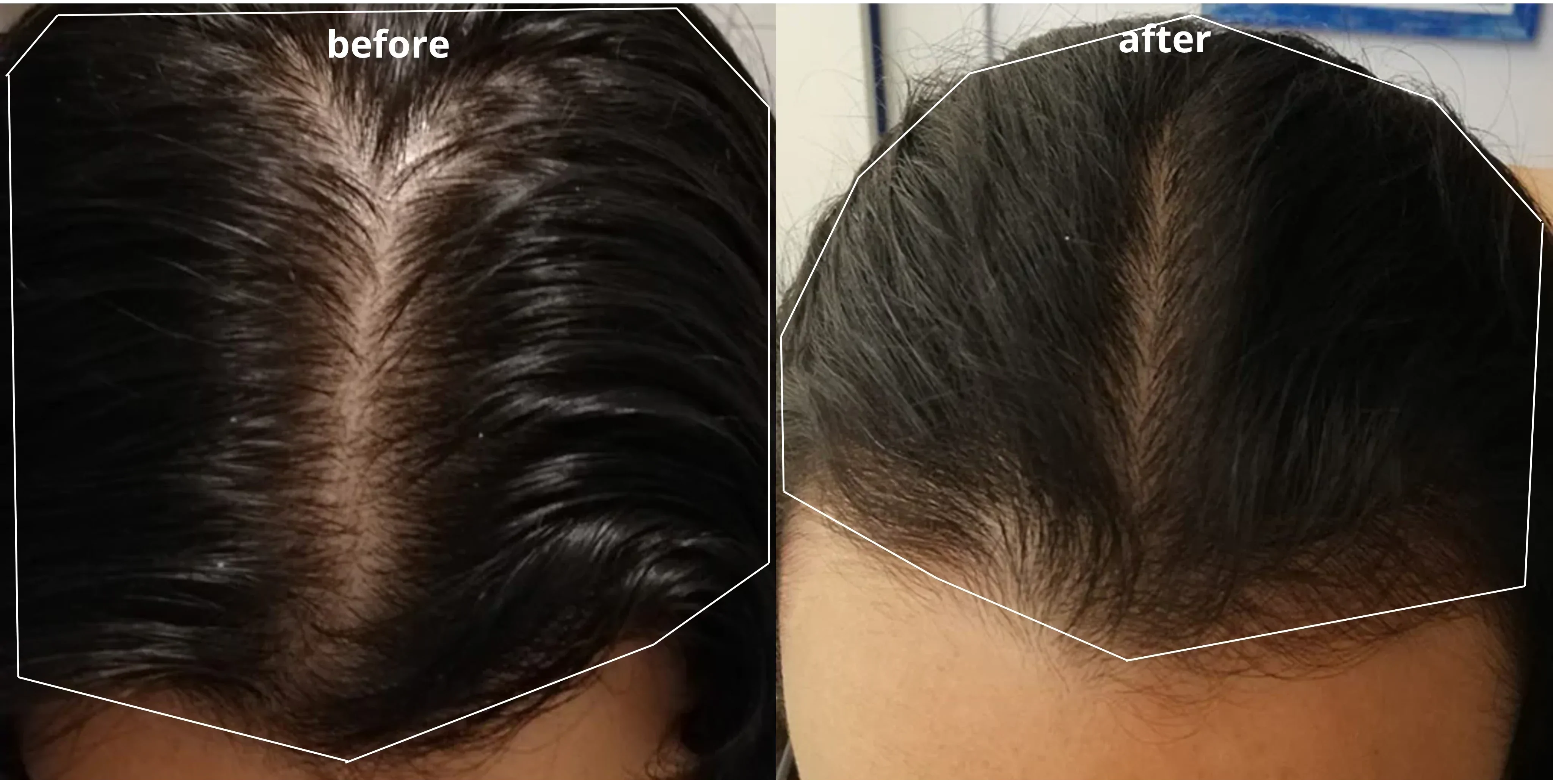Are you wondering if microneedling for hair loss could be the solution you've been searching for?
This innovative technique has gained popularity for its potential to rejuvenate the scalp and promote hair growth.
In this article, we'll explore how microneedling works, its benefits, and what you can expect during the treatment process.
Whether you're just curious or seriously considering this method, read on to discover how microneedling might help you regain not just your hair, but also your confidence.
Table of content
What is microneedling?

Microneedling is a technique that stimulates hair growth by causing minor skin injuries. It involves using a skin roller equipped with tiny needles to boost collagen production in the scalp. Originating as a scar treatment in the 1990s, microneedling has since been explored as a promising solution for conditions like androgenic alopecia and alopecia areata.
When paired with platelet-rich plasma therapy (PRP), it can significantly address early signs of pattern baldness in both men and women, enhancing scalp health and hair regrowth.
As your leading source for hair health information over the past 4 years, we never compromise on accuracy. When it comes to your health, you deserve information you can truly rely on - and earning your trust is our top priority.
Here's how Scandinavian Biolabs ensures every piece of content meets the highest standards of accuracy and integrity:
- Credentialed Experts: Our reviewers are actively practicing doctors and medical researchers
- Stringent Reviews: Content undergoes rigorous editing by subject specialists and review by a practicing doctor.
- Evidence-Based: We rely on well-established research from trusted scientific sources like peer-reviewed journals and health authorities.
- Full Transparency: Our editorial standards, writer credentials, reviewer credentials, correction process, and funding are all publicly documented.
- Independent Voice: While we do promote products, we operate in a vacuum to business operations. Our main goal is just an unwavering commitment to providing medically-sound guidance.
You can count on Scandinavian Biolabs to consistently deliver the trustworthy health information you deserve. Read our Editorial Standards.
How does microneedling work?
Microneedling operates by making small punctures in the scalp using a roller with fine needles. These needles can vary in size but are all designed to gently injure the skin in a controlled way. This process is believed to trigger factors that promote hair growth by activating the body's healing response.
Before starting the procedure, a healthcare provider typically applies a topical anesthetic to minimize discomfort.
The actual microneedling session is brief, usually taking less than 10 minutes, and may be followed by the application of a soothing balm or additional treatments depending on the patient's goals.
This method is not only about stimulating hair growth but also about improving the overall health of the scalp. By encouraging natural repair processes, microneedling makes for a compelling option for those looking to enhance their hair’s thickness and vitality.
How effective is microneedling at promoting hair growth?

Microneedling has shown promising results in enhancing hair growth, especially when combined with other treatments. A study published by the International Journal of Trichology highlighted its effectiveness when used alongside topical minoxidil. This combination led to a significant increase in hair regrowth, with 80% of participants experiencing a 50% boost in hair density.
Such findings suggest that microneedling, particularly when paired with minoxidil, can be a potent tool against early stages of androgenetic alopecia.
However, it's important to note that microneedling is not a cure-all. While it can slow down hair loss conditions like androgenetic alopecia and alopecia areata, it doesn't work for everyone.
Those dealing with permanent baldness, for example, might not see any benefit from microneedling treatments and may need to consider more definitive solutions like an FUE hair transplant.
What are the benefits of microneedling for hair loss?
Microneedling is more than just a potential hair growth stimulant; it offers several benefits that extend beyond the scalp:
- Enhances collagen production: Originally used for scar treatment, the increase in collagen can also benefit the scalp.
- Induces stem cells in hair follicles: This can potentially kickstart hair growth.
- Improves absorption of hair loss treatments: Such as minoxidil, topical steroids, and platelet-rich plasma.
Research, including a study on the use of microneedling with a topical corticosteroid for treating alopecia areata, supports these benefits.
This treatment approach not only promotes healing and rejuvenation but also enhances the effectiveness of other hair loss products by increasing their absorption into the skin.
Microneedling for hair loss results: before and after
Microneedling is gaining attention for its potential in hair regrowth, with several studies indicating positive outcomes when combined with other treatments:
- 2022 Study in the Journal of Cosmetic Dermatology: Found significant improvements in hair regrowth when microneedling was combined with topical minoxidil.
- 2013 Pilot Study: Reported that using a derma roller with 5% minoxidil lotion once a week increased hair counts more significantly than using minoxidil alone.
- 2022 Study with 18 Participants: Showed that microneedling with 5% minoxidil once a week for six weeks was effective and safe, with 83.3% of participants satisfied with their hair growth 10 weeks post-treatment.
- Study on PRP and Microneedling: Revealed that combining PRP with microneedling was more effective than PRP alone in treating moderate androgenetic alopecia.
What are the side effects of microneedling on the head?
While microneedling can be beneficial, it's not without potential side effects:
- Bruising
- Oozing from the wounds
- Redness
- Swelling
- Pain
- Risk of scarring
- Increased sensitivity to the sun
It's essential to follow aftercare instructions to prevent complications like infection and to discuss any pre-existing conditions with your healthcare provider that might affect healing. Always ensure that the treatment is performed under proper medical guidance to minimize risks.
What is the cost of microneedling for hair loss?
The cost of microneedling for hair loss typically ranges from $200 to $700 per session, depending on the size of the treatment area. Since microneedling is generally considered a cosmetic procedure, it is not usually covered by medical insurance. However, if the treatment is performed for medical reasons, some costs might be covered by your insurance.
Can you do microneedling at home?

Microneedling at home might seem like a convenient and cost-effective option, but it's important to understand the differences between at-home devices and professional treatments. "The at-home microneedling devices are very different from what we use in a dermatologist’s office," explains Dr. Bullock.
Professional devices use longer needles that can trigger a more effective collagen and wound-healing response, which at-home devices cannot replicate.
Risks of DIY microneedling include pain, potential skin damage, and infection risks. Dr. Bullock warns, "Using a medical-grade dermaroller at home would be very painful and could permanently damage your skin."
Professionals use numbing medication and sterile equipment, ensuring the treatment is both safe and effective. "If you’re considering at-home microneedling, stick to devices designed for home use and avoid overusing them," advises Dr. Bullock.
Dermaroller at home
While the idea of using a dermaroller at home to save on costs and time is tempting, there are several risks and downsides:
- Lack of knowledge on needle size and proper usage
- Difficulty in accessing and effectively treating all scalp areas
- Absence of professional adjuvant treatments like platelet-rich plasma
A professional can minimize side effects and manage any complications that arise, something difficult to handle on your own. "It's much safer to leave microneedling to the hands of licensed professionals," dermatologists recommend.
To complement professional treatments, consider the Scalp Activation Derma Roller. This product is designed for safe, supplemental home use to enhance your hair care regimen.
How to use a dermaroller for hair regrowth
Using a dermaroller for hair regrowth involves a few careful steps to ensure safety and effectiveness:
- Cleanse your scalp to remove any oils or dirt.
- Sanitize the dermaroller with alcohol before and after each use.
- Apply gentle pressure and roll over the scalp in multiple directions: vertically, horizontally, and diagonally.
- Apply a hair regrowth treatment if recommended, to enhance absorption.
- Clean and store the roller properly after use.
Follow these steps consistently as part of your hair care routine, ideally under the guidance of a healthcare professional, to see the best results.
A better approach for your overall hair health

If you're exploring ways to combat hair thinning and enhance hair growth, consider the Bio-Pilixin® Activation Serum.
Developed by experts, this innovative serum leverages advanced stem cell technology to deliver plant growth factors that nurture hair follicles and encourage hair growth. Its formula is designed to stimulate blood flow and supply essential nutrients to your scalp and hair.
The effectiveness of Bio-Pilixin® Serum isn't just a claim; it's backed by robust clinical evidence.
In a trial involving 40 participants, including men and women aged between 18 and 65 experiencing various types of hair loss, impressive results were observed.
After just 45 days, 77% of the participants reported reduced hair loss, and by the 150-day mark, 93% noted a clinically tested reduction in hair loss.
Additionally, 73% of participants saw a measurable increase in hair density.
What’s more, many users report experiencing visible changes like reduced hair fallout in the shower within just a few weeks.
This early indication can be a real morale booster as you continue with the treatment.
We are so confident in the Bio-Pilixin® Serum's performance that we offer a 150-day money-back guarantee.
This commitment allows you to try the serum and see the benefits for yourself, risk-free.
Whether you're facing early signs of hair thinning or more established patterns of hair loss, Bio-Pilixin® Serum might be the drug-free, safe solution you've been searching for to revitalize your hair health.
Conclusion
Microneedling for hair loss presents a promising option for those looking to enhance their hair growth and improve scalp health.
While it is most effective when combined with treatments like minoxidil or PRP, it's important to consider the professional guidance and potential side effects.
Additionally, products like Bio-Pilixin® Activation Serum offer a supportive approach to managing hair loss, with clinically proven results to back their efficacy.
As with any treatment, results can vary, but with the right approach and consistent care, achieving healthier, fuller hair is within reach.
Whether you're considering professional treatments or supporting your hair health journey at home, staying informed and consulting with healthcare professionals will guide you towards the best solutions for your needs.
FAQs
Does microneedling actually work for hair loss?
Yes, microneedling has been shown to be effective in treating androgenetic alopecia (commonly known as male and female pattern baldness) and some cases of alopecia areata. It's important to consult with a dermatologist to determine the type of hair loss you have and whether microneedling is suitable for you.
How long does microneedling take to regrow hair?
You might start noticing improvements in hair regrowth and density as early as 6-10 weeks with regular treatments. However, it's essential to understand that microneedling is not a permanent solution for pattern hair loss, and results can vary.
How long do microneedling results last?
The results from microneedling can last several months to a year, but this varies based on factors like your skin type and condition. Ongoing maintenance sessions may be necessary to sustain the effects.
Is microneedling painful?
Microneedling is generally not considered painful. It is a minimally invasive procedure performed under local anesthesia to minimize discomfort, making it a tolerable treatment option for many people.
Can I wash my hair after microneedling?
It is advised not to wash your hair for at least 4 hours after microneedling to avoid irritating the scalp or introducing bacteria to the treated area. Additionally, sleeping on a clean pillowcase post-treatment is recommended to help prevent potential infections.
References:
- https://doi.org/10.1111/jocd.15263
- https://doi.org/10.4103/0974-7753.114700
- https://doi.org/10.7759/cureus.30418
Read more:







